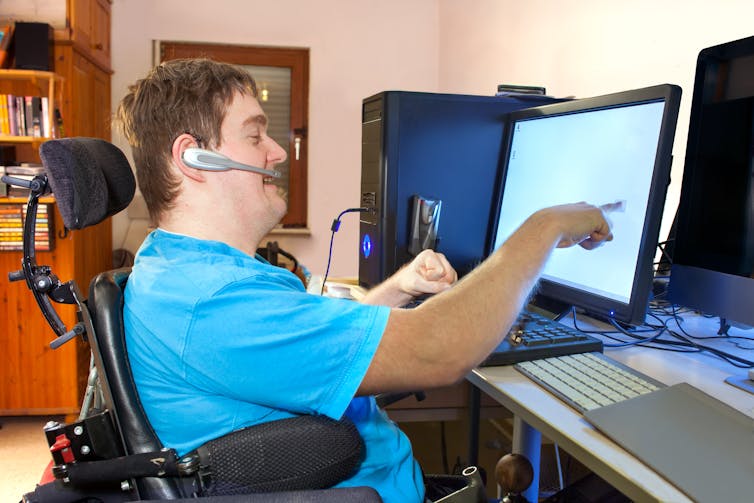As an individual with a disability, I live in fear that if admitted to hospital, a health-care provider may deem me incompetent based on my disability. This may seem unlikely, but my lived, academic and professional experiences have shown me that assumptions regarding the capabilities of persons with disabilities are often inaccurate and misguided.
Further, many of the assessments used to assess capacity do not account for specific types of disabilities. For example, the Montreal Cognitive Assessment (MoCA), in which the subject is asked to draw a clock face, could present difficulties for someone with a visual disability, even if that visual disability doesn’t impact the person’s cognition.
Another example is the Mini-Mental State Examination (MMSE), which asks seniors the month and the season. They are asked to spell “world” backwards and forward. If one were dyslexic, spelling “world” forward could present a challenge, and spelling it backwards would be even harder.
While the MoCA and MMSE are tools designed to assess cognition and not necessarily capacity, test results indicating “compromised cognition” tell an incomplete story about people on paper that could jeopardize their right to have agency in real life.
Capacity
Capacity raises a lot of important questions about consent, autonomy, agency and who determines capacity.
Capacity assessments are formal assessments of a person’s mental capacity to make decisions about property and personal care. Under the Substitute Decisions Act in Ontario, many situations require capacity assessments to be conducted by specially qualified assessors who must follow specific guidelines.
Capacity is typically described as a person’s capability to understand the information relevant to making a certain decision and appreciate that their decisions or indecision may impact themselves or others. Capacity assessments may be conducted for a range of reasons, including cognitive decline after experiencing illness, or disability during an episode in hospital.

Some parents of young adults with capacity limitations due to developmental disabilities may incorrectly believe that guardianship is necessary and inevitable.
Families may unrealistically hope that a capacity assessment will somehow solve difficult practical or ethical issues. Some parents of young adults with capacity limitations due to developmental disabilities may incorrectly believe that guardianship is a necessary and inevitable next step as their child nears adulthood. Professionals may also misunderstand what can be achieved through the capacity assessment process and may conflate disability with lack of capacity.
Systemic ableism
Our health-care system is fraught with paternalistic attitudes surrounding the capabilities of people with disabilities. The systemic ableism that exists in health care can, in part, result in people being prematurely placed in long-term care homes — particularly people who have disabilities. Health-care providers may not be aware of alternatives to long-term care such as microboards, direct-funded attendant services, supportive housing and co-housing.
Co-housing is a type of collaborative housing in which residents actively participate in the design and operations of their own community. This community may exist within a single home, on a shared piece of land, in an urban neighbourhood or in a cluster of houses.
Microboards are a type of self-directed support organization that helps individuals pursue their hopes and dreams and work with others to design individualized and customized supports aligned with their personal vision of the future.
Direct-funded attendant services refer to funding that is paid directly to the consumer to recruit, hire and train their own personal support attendants.
Dignity of risk
Dignity of risk is also associated with capacity. It refers to the concept of affording a person the right (or dignity) to take reasonable risks, and indicates that the impeding of this right can suffocate an individual’s personal growth, self-esteem and overall quality of life. In health-care and social services settings, the emphasis is all too often on a custodial approach to “do what is best” for an individual, and little consideration is given to the dignity of risk, nor the right each of us has to take risks.

The term “dignity of risk” was first coined in 1972 by disability advocate Robert Perske. It referred to the overprotective safeguards provided to people living with disabilities in care settings and the paternalistic nature of those settings. Perske asserted that this was patronizing and diminished a person’s freedoms and self-esteem.
Care-centre professionals should not focus on avoidance of all risks, but should instead focus on how to support individuals to safely do what they want. Canadian, British and Australian mental capacity acts and laws share three common principles that demonstrate this understanding of decision-making and capture the concept of dignity of risk:
-
Adults have the right to make their own decisions, and to be assumed to have the capacity to do so, unless there is evidence to the contrary.
-
Capacity should be viewed as decision-specific.
-
Adults should be offered all reasonable support and assistance in making and following through on decisions before others step in to make decisions for them.
Even if an individual has been deemed incapable of performing certain tasks, they should be supported, as much as possible, to preserve this dignity of risk. A health-care provider’s role could include ensuring that clients make informed decisions by offering them all relevant information and maintaining support when clients execute the decision, whatever the outcome.
As an alternative to completely removing an individual’s autonomy when she or he is deemed incapable, a supported approach to decision-making can allow individuals to make decisions along with their advocates and support persons. This approach not only enables individuals to feel more in control of their own lives, but also affords them opportunities to safely explore the risks and benefits associated with their decisions.
There seems to be very little interplay between health care and social services regarding capacity assessments, with the former lagging in the adoption of personalized individualized approaches. One such approach that’s been proposed is the concept of a microboard. However, there are more than 1,200 microboards in Canada, and I know of none that provide personalized funding to support seniors living with a disability.
In order to achieve a shift towards shared decision-making between older adults and others with disabilities, these individuals need to be encouraged and supported to take the lead in creating and managing structures that support them on their own terms. This should be done with the co-operation of offspring or trusted people who serve as the directors of a trust or microboard.
Significant benefits can be gained from improving understandings of capacity that involve individuals in shared decision-making. Benefits can also be gained from teaching medical and allied health-care providers that a shift away from the clinical approach to capacity — limiting people’s choices — and a focus on exploring options for allowing safe risk-taking or implementing workplace/institutional policies that foster and support positive risk-taking would be a step in the right direction.
Source: The conversation
